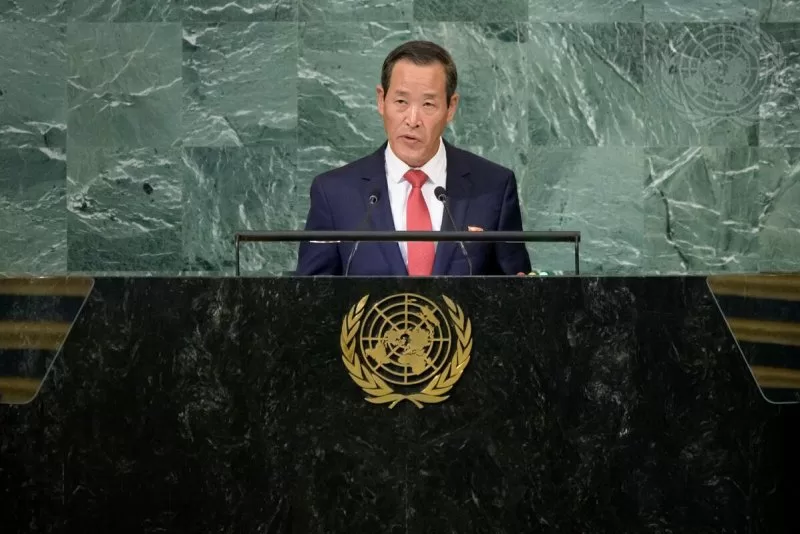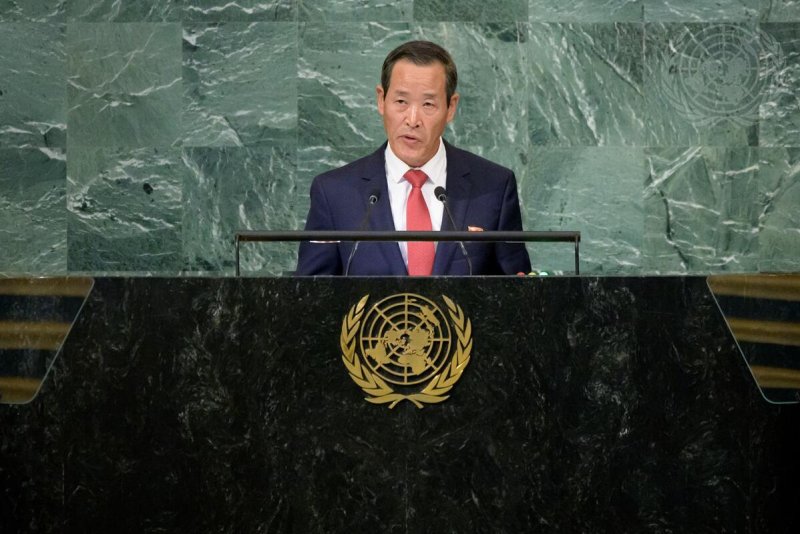The “principle stand” of South Korea’s government is to be committed to “social economic development, defending regional peace and stability and realizing international justice,” Kim Song, Permanent Representative of the Democratic People’s Republic of Korea to the United Nations, said Monday. File Photo by Manuel Elías/United Nations
Sept. 30 (UPI) — South Korea’s United Nations representative spoke on Monday during its 79th debate session in New York and laid out his government’s vision for the Korean peninsula’s future.
Song Kim — the permanent representative of the Democratic People’s Republic of Korea, otherwise known as South Korea — took the podium during the General Assembly and hit on several topics, including peace in the region, nuclear weapons and advances in South Korean society. Kim also was critical of what he called the ongoing “Israeli genocide,” as he discussed the U.N.’s global reputation and how it is affected by the United States.
The world, Kim told U.N. delegates Monday afternoon in New York, is “faced with unprecedented serious challenges and crises.”
Ongoing war, such as Israel’s military incursion in Gaza in response to an attack by Hamas, he said, has “taken the lives of the tens of thousands of innocent civilians.”
As a result, the global situation has created the “most appalling humanitarian crisis since World War II,” the Korean representative told U.N. delegates.
Aside from nations at war, Kim said today’s world is confronted with deadly risks of climate change, too.
“The worsening of normal weather conditions,” as Kim characterized it, is extreme high temperatures, drought and “torrential rain and flooding.” And along with that, he said, are other world problems that are linked, such as food insecurity, unmet energy needs, unemployment, poverty and social inequality.
South Korea’s example
Kim told the assembly about the social and economic advances being made in South Korea as he predicted that the Korean peninsula is poised for unique growth and change in coming years.
The “principle stand” of his government, he said, is to be committed to “social-economic development; defending regional peace and stability; and realizing international justice.”
“Today the world is faced with many challenges,” he said, as he illustrated how South Korea is responding to some of them.
As an example, he said, primary DPRK government policy has been to supply its schoolchildren with dairy products for nutrition.
And as a result, he said, the south has witnessed “continued improvement” in the “quality of childcare and education.”
Kim said that outcome demonstrated a sustainable development of the economy, which he added is “growing in many different areas” and that also are “promoting the welfare of the people.”
As an example, Kim, who has been the south’s permanent U.N. representative since 2018, pointed to the “new dwelling houses” for both the nation’s urban and rural citizens and given free of charge by the government.
Regional stability, nuclear aspirations
Still, he said, ongoing threats to the DPRK homeland have been a foremost issue for more than 70 years.
South Korea’s current nuclear weapons stance has brought a level of stability to the region, Kim said.
Though South Korea long has wanted to develop strategic nuclear arms to counter North Korea’s persistent war-mongering threats, in 2023, Kim’s government agreed not to develop nuclear weapons in exchange for the United States deploying nuclear-armed subs in South Korea.
But DPRK’s desire for strategic nuclear weapons — what he called the south’s “position on nuclear weapons” — has made “the U.S. hostile toward us,” he said.
“As such, any talk about our nuclear threat only proves a conceived hostility” toward DPRK, he said, adding that future regional security on the peninsula will be “intricately complicated” for future generations.
Unless, he said, “the U.S. and its followers change their confrontational and oppressive nature.”
Kim stressed that it is important that DPRK maintains its “powerful strength capable of defending national security interests, and guaranteeing peaceful development.”
In doing so, South Korea plans to chart a new diplomatic course for its future, Kim said, adding that the government will “never bargain” over its national strategy with anyone because the south’s freedom was “gained for us by bloody struggle of the entire Korean people.”
Continuing, he also said that South Korea’s government intends to deal with the United States government and not any particular political party of “the administration” of whomever is elected president. And the next U.S. president, he warned, will have to face a relationship with Korea “different from what the U.S. used to think.”
Sharp criticism of Israel, U.S.
Kim also used his address to cover global diplomacy and was highly critical of some nations — including a longtime ally — and ongoing conflicts. He spoke against acts of dividing people and member nations into “two camps.”
Kim said the “high-handiness” and” double standards” of the United States and “certain U.N. member states” have been a global concern.
The “indiscriminate massacre by Israeli authorities,” he said, has so far claimed more than 40,000 Palestinian civilian lives in Gaza. “And, thus, exposed a nation to complete extinction,” he said.
He expressed his sympathies to the “Palestinian victims” of what he called the “Israeli genocide.”
The U.N. exists to prevent the recurrence of war “that has inflicted untold sufferings to mankind,” he said, adding that it was “a shame” and “deplorable” the “such acts against humanity” have gone on in Gaza for so long.
“This is due entirely to the patronage of the U.S.,” he said.
America has “discredited the authority of the U.N.” and “incited crimes against humanity.”
As for Russia’s war with Ukraine that “has dragged on for more than three years,” he said the “eastern expansion of NATO” was partially to blame.
“The United Nations is misused” for the political ambitions of other nations, he said.

